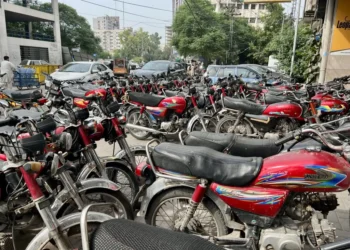LAHORE; The Lahore High Court (LHC) on Tuesday imposed a complete ban on all commercial activities every Sunday in Lahore to combat the worsening problem of smog and environmental pollution.
Justice Shahid Karim of the LHC heard multiple petitions related to environmental issues and directed the complete closure of commercial activities on Sundays, along with strict enforcement of the 10 pm closure for marriage halls.
Lahore, the capital of Punjab province, was once again declared the most polluted city in the world on Tuesday. According to the Swiss air monitoring agency IQAir, Lahore recorded an Air Quality Index (AQI) of 372 at 8:30 am, which falls under the “hazardous” category.
During the proceedings, Deputy Commissioner Lahore Musa Raza appeared before the court and presented notifications enforcing the 10 pm closure for markets and restaurants. Justice Karim remarked that issuing notifications was not enough and that their strict implementation must be ensured.
The court also ordered that a director-level officer from the Environment Department attend each hearing to brief the bench on progress.
A commission member informed the court that ongoing excavation near Khayaban-e-Firdousi was causing daily traffic congestion. In response, WASA’s legal adviser Irfan Akram stated that the sewerage system across Lahore was being upgraded and progress reports would be submitted at the next hearing. The court directed WASA to present detailed timelines of all ongoing sewerage projects in the next session.
The hearing was adjourned until November 7.
Provincial authorities have blamed the poor air quality on polluted easterly winds blowing from India and nearby regions. This toxic haze has enveloped much of Punjab and northern India for several days, drastically reducing visibility and causing health issues such as throat irritation, coughing, and breathing difficulties.
The severe pollution coincides with the arrival of winter when stagnant winds, lower temperatures, and emissions from vehicles, factories, and post-harvest crop burning trap pollutants close to the ground.
Each year, the combination of low-grade fuel emissions and seasonal stubble burning contributes to thick smog across Punjab. Health experts warn that prolonged exposure to such toxic air can lead to serious health conditions, including strokes, heart disease, lung cancer, and respiratory ailments.




































































